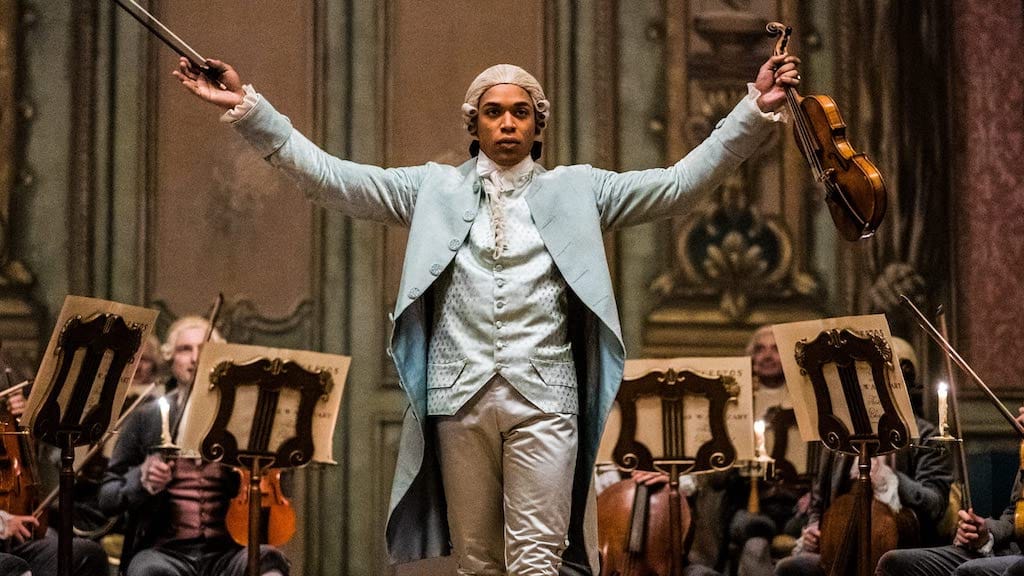This ‘Chevalier’ makes too many cuts

Four years ago, I wrote a column, ‘Virtuoso of the Sword and the Bow’, celebrating the life and times of a then little-known French-Caribbean composer, the first classical composer of African descent to attain widespread acclaim in European music: Joseph Bologne, Chevalier de Saint-Georges (1745-1799).
At the time I had said that “his life-story reads like a Hollywood blockbuster”: in addition to being a composer, he was a much-admired (and much-envied) virtuoso violinist, an expert athlete, the “greatest fencer in all of France”, boxer runner, ice-skater, the “best marksman in Europe”, and so much more. He was one of the first black Freemasons in France. He led a legion of over a thousand Black troops (nicknamed the Legion Saint-Georges) to defend the new Republic after the French Revolution. His subordinate lieutenant colonel was Alexandre Dumas père, father of the famous writer. (It is believed that Porthos from the Three Musketeers was based on Dumas père, and Aramis on Saint-Georges.)
So when I heard a biographical drama film (titled simply ‘Chevalier’) based on his life had been made in the US in 2022, I knew I had to see it. I finally got an opportunity to see it a few months ago.
I totally get that there can be ‘artistic license’ even in a biopic, but when there is so much leeway with the facts, to me it poses a serious problem, because too often a viewer who doesn’t bother to check the facts may come away believing that the fictional episode (added to spice up the film or to underscore a point) actually happened.
Take the opening scene of ‘Chevalier’. We are told the setting in “Paris, France: Prelude to Revolution.” So the viewer is taken back to a time somewhere before the French Revolution, 1789. But then we see and hear Wolfgang Amadeus Mozart (1756 -1791) on stage, performing the first movement of his violin concerto no. 3 in G major K. 216. We know Mozart was in Paris between the years 1777-78.
But then Mozart takes “requests” from the audience, whereupon “a dark stranger” (Chevalier, played by Kelvin Harrison Jr) “requests” Mozart’s violin concerto no. 5 in A major K. 219, and impudently challenges him to a violin duel. Sparks fly, and (no prizes for guessing), Chevalier makes the greater virtuosic impression among the audience, causing Mozart to fume, “Who the @#% is he?”
Now we know that Chevalier lived from 5 July to 11 September 1778 at the Chaussée d’Artin Paris residence of German-born French-language journalist, art critic and diplomat Friedrich Melchior, Baron von Grimm, where Mozart was also staying after the unexpected death of his mother in the same city in July that year. There is no documented evidence that the two composers ever met, but it is reasonably supposed by many that they did. Nevertheless, a sensational duel such as this would scarcely have gone unrecorded, so this is pure fiction.
Mozart was in deep mourning for the rest of his stay in Paris (he left in September 1778) and did not (as far as my research goes) give a concert in that time. We know Mozart performed two of his “Paris compositions, his A minor piano sonata K. 310/300d and his Symphony no. 31 (“Paris”) on 12 and 18 June 1778.
Although there is speculation that Mozart might have copied some of Chevalier’s work and incorporated it into his own, I’ve not yet seen clear evidence of this. The suggestion that the writing of “dark-skinned villain” Monostatos into Mozart’s final opera ‘Die Zauberflöte’ (The Magic Flute) was his jealous dig at Chevalier is however mentioned in the film.
The film also shows the racial abuse and humiliation Joseph Bologne faced from the time his father admitted him into an elite Parisian academy, and despite all his successes in fencing and music, even after he was made a Gendarme du Roi (Officer of the King’s bodyguard) in Versailles and a Chevalier (Knight).
The unfair (in more ways than one) conundrum of his life is well brought out in the film. Chevalier de Saint-Georges could lead a life of privilege due to his ‘half-whiteness’, but was ineligible for any titles of nobility nor could be marry into ‘’aristocracy’ due to his ‘half-blackness’ under France’s prevalent Code Noir (Black Code). And yet as a knight, a Chevalier, he would have to forfeit even that bestowment if he were to marry a ‘coloured’ woman under the terms of the same Code Noir.
He was himself the product of an inter-racial union (his father, Georges Bologne de Saint-Georges, was a wealthy, white plantation owner in the French colony of Guadaloupe, while his mother was one of the Creole people Georges kept enslaved), born out of wedlock. And lived to tell the tale, despite all the humiliations.
We don’t know for sure whether Chevalier’s illicit love affair with salonnière, and novelist Marquise Marie-Josephine de Montalembert, a married woman, resulted in a love-child. The film claims it did, and has the enraged Marquis murder the newborn when it is found to be “dark-skinned.” This was an inter-racial liaison too, but with the gender “colours” switched. A child born to a white mother and black father would have been untenable in eighteenth-century France, or indeed, the rest of the “civilised” world.
I realise of course that a conventional-length feature film cannot possibly do justice to anyone’s life story, but I had hoped that this much-awaited biopic about a much-neglected composer would make a bigger celebration of his music.
Although the fleeting credits at the very end (blink and you’ll miss them) tell us that Harrison Jr. was coached by Ana Popescu Deutsch (violinist and music teacher at the North London Conservatoire), he doesn’t come off convincingly as the staggeringly virtuosic violinist that Chevalier de Saint-Georges certainly was.
The film ends in 1789, with the beginning of the French revolution, but there was yet another whole chapter, another whole decade of Chevalier’s life left untold, where he put down his violin and bow and picked up the sword again. As a colonel he led France’s first all-black military regiment, (but this is pithily summarised in the film’s closing credits).
The coda to the Chevalier’s life is an anti-climax. Despite his valiant contribution to the Revolution, in 1793 he was arrested without charge, and later dismissed from military service.
He however continued to give concerts almost until his death.
When Napoleon assumed power, he re-instated slavery and banned the performance of Chevalier de Saint-Georges’ music.
A lot of his music has been lost, but with interest in him having been revived, it is being played more often. His violin concertos are a revelation, technically much more virtuosic than those of Mozart.
I look forward to more films about him. His music is getting played more frequently on radio stations and in concert halls. The story of Joseph Bologne, Chevalier de Saint-Georges is far from over. It is just beginning.
This article first appeared in The Navhind Times, Goa, India.





